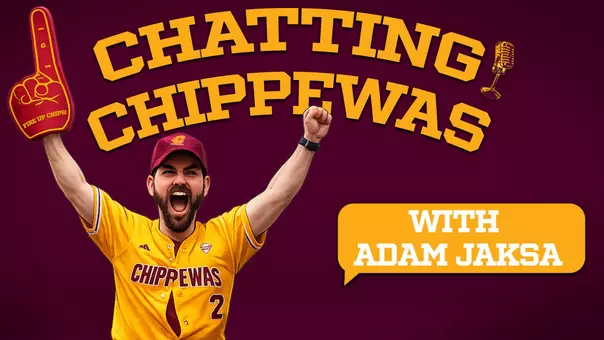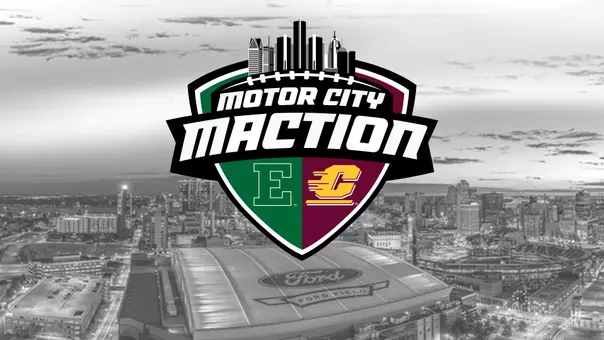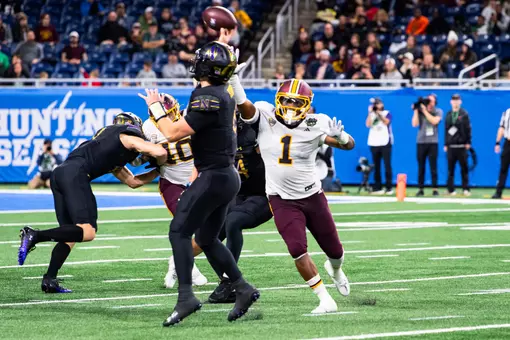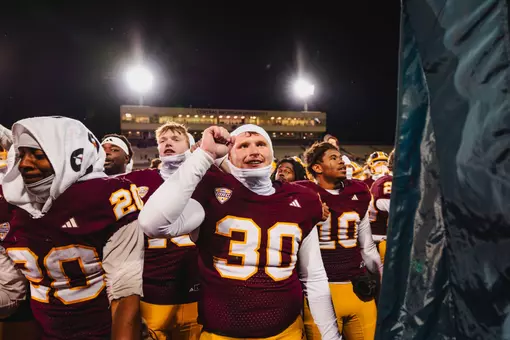Central Michigan University Athletics
Bowl Game a Working Vacation for Staffers
12/23/2014 12:00:00 AM | Football
By Andy Sneddon, CMUChippewas.com
Photo Gallery | Football Insider
NASSAU, Bahamas - The Popeyes Bahamas Bowl. Atlantis Resort. Sun and sand, snorkeling and jet skis, water slides and palm trees.
The perfect place to relax, unwind, take it all in. A Caribbean dream. Life is good. Breath.
The Central Michigan football team has been afforded a once-in-a-lifetime opportunity to enjoy one of the world's great vacation destinations in preparation for its Christmas Eve showdown with Western Kentucky.
But for many in and around the program, rest and relaxation have taken a backseat. In fact, it's been a working vacation, with a heavy emphasis on work.
Those who handle the equipment, those who tape the ankles and keep the players physically healthy and ready to play, those who record it all and deliver it to the coaching staff.
"Bowl games are fun, but at the same time, you'll do more work in that week than the average person does in their job in three months," says Jay McDowell, who is in his fifth year as CMU's video coordinator. "Kiss the bed good-bye, find the Red Bull, and hunker down."
Mobilizing an entire football program for a typical regular-season road game is one thing; doing it for a bowl game in a foreign country is quite another. It was a massive undertaking that required meticulous planning, long hours and plain ol' muscle.
The experience brought to the table by the three men in charge - McDowell, equipment coordinator Michael McPike, and head athletic trainer Greg McGillvary - surely made the enormous undertaking run as smoothly as it possibly could have. The trio has some 75 years of combined experience in their respective fields.
McDowell said that for a normal road game to, say, Toledo, his staff can pack all of its necessary equipment into one trunk and three cases.
For the Popeyes Bahamas Bowl, the requirement was 17 trunks and cases. Because the Chippewas spent the better part of four days on the island including daily practices and meetings, that called for computers, projectors, cables, cameras, remote controls, tripods, a printer and paper, among other things.
"I pretty much just picked up my office and moved it to the Bahamas," says McDowell, who is in his fifth year at CMU, 23rd as a college football video coordinator. "If somebody walked in my office (at CMU) this week and looked at my desk, all they'd find are some pens and paper clips on my desk."
The daunting task of finding room to safely transport everything fell to McPike. For his department, that meant game and practice uniforms, shorts, t-shirts and under gear, helmets, pads, shoes, hats, chinstraps, mouth pieces, wristbands, socks, shoe laces and coach's gear.
Did we leave anything out? McPike surely didn't.
It was all loaded onto a trailer and pulled by a semi, just as it normally would on any given weekend that the Chippewas play away from Mount Pleasant.
The cargo on a given road trip weighs in at about 6,000 pounds, McPike says. It's double that for the Bahamas Bowl. And when it was tightly packed into the trailer, "we were wondering if were going to be able to open it back up after got it loaded because it was that tight," he added.
From Mount Pleasant, the gear was hauled to the 767 charter waiting at Capital Region International Airport in Lansing. It was loaded, by the staff, in the cargo hold of the plane. After touching down in the Bahamas, it was unloaded again, by the staff.
McPike, a hands-on guy if ever there was one, oversaw the unloading and re-loading, and his hands touched a good percentage of the bags, boxes and trunks.
That haul included any non-personal items required by the entire travel party of some 230, including the medical staff, the radio broadcast crew, athletic communications, the video equipment along with all that the Chippewas require to simply practice: Footballs, dummies, Port-a-Cool machines, kicking nets, marking cones and dots, and a game clock.
Even the equipment to fix the equipment - tools for helmet repairs, for instance - take up a good amount of space. Two trunks, each measuring 3 feet-by-5 feet, are required for that job alone.
McPike and his staff - seven student-managers have made the trip, from the 16 that are available to aid in the effort throughout the season - are responsible for ensuring that it's all in proper working order, and for getting it to and from the practice site and to Thomas A. Robinson Stadium on game day.
Those student-managers also play a key role in helping practice run efficiently by getting the equipment to the required areas on the field and for chasing down footballs, working the chains and down box, and monitoring the ever-present clock that rules the length of each session in any given workout.
Head coach Dan Enos is clearly in charge on the field, but it is McPike who emcees on a day-in, day-out basis, manning the megaphone speaker or the air horn to signal the players and coaches to move on to the next scheduled session.
Just as in packing the semi, there is procedure and schedule to be followed, and McPike adamantly sticks to it.
"If it wasn't for the help of my student-managers we wouldn't be able to get done what we're expected to do," McPike says. "The student-managers mean quite a bit to the coaching staff and to me because they are really the backbone of what we need to do every day.
"The student-managers help us be proactive in everything that we do."
One major factor in the increased amount of gear is the sheer number of players, nearly 100, who have made the trip. For a typical Mid-American Conference road game, the Chippewas travel with 66 players.
There is also the matter of preparing for every situation - rain, for example, which would than require water-repellent gear for the players and coaches. It hasn't happened - yet -- on the trip, but one never knows. If it does, McPike and Co. will be ready for it.
McPike's crew will repeat the process, in reverse, upon CMU's return to the Lansing airport after the game on Christmas Eve. Once the trailer is loaded, it is hauled back to Mount Pleasant, where the staff will immediately unload at Kelly/Shorts Stadium.
And McPike will get to work on the laundry "making the whites white," he says, adding that it isn't unusual for him to pull an all-nighter, catching an occasional nap on the sofa hide-a-bed located in the Kelly/Shorts equipment room.
The training staff, led by McGillvary and assistant Joe Fox, take a backseat to no one when it comes to keeping busy, though their work days on-site in the Bahamas do not differ dramatically from those during a typical week during the regular season.
The staff, which includes a number of graduate assistants along with student-trainers, regularly begins its work day before dawn. They start with pre-practice taping and treatments.
"Almost every player gets something done," says McGillivary, who is in his 31st year with the university.
The most common tape requirement is on a player's ankle or ankles, and McGillvary estimates that the Chippewas will utilize more than 3,000 rolls of the recognizable 1 1/2-inch wide white athletic tape in a season.
During practice and on game days, McGillvary, Fox and their aides are equipped with fanny-packs containing the tools of the trade - tape, scissors, bandages, salve, etc. - and are vigilant in ensuring that the players remain hydrated. The staff remains on high alert. In the event of an injury, be it a minor scrape or something more serious, they spring into action,
"We're kind of like insurance," McGillvary says. "You pay for it, but you hope you don't have to use it."
Just like their equipment and video counterparts, the training staff packed heavily for the trip, bringing anything and everything they could have possibly needed, including the ever-present tape, over-the-counter medications, crutches, splints, a defibrillator, and portable treatment and taping tables.
McGillvary is into his fourth decade as a trainer, and both McPike and McDowell have plied their respective trades for 20-plus years. All are aware that they play critical roles in the overall and long-term success of the program, even if the roles they and their respective staffs are easily overlooked by the average fan.
"I get an opportunity to work with relatively healthy and motivated young people," McGillvary says. "These kids don't want to be injured. They want to be playing football. They're good people.
"You see yourself making a contribution to the overall success of the program. We're all Chippewas. We all want the same thing."





